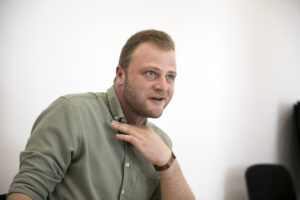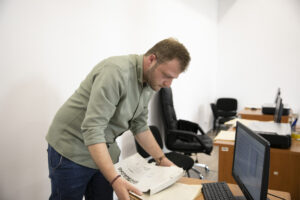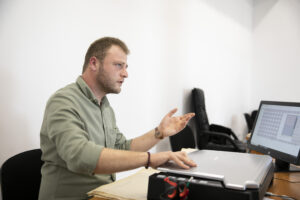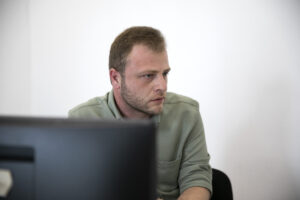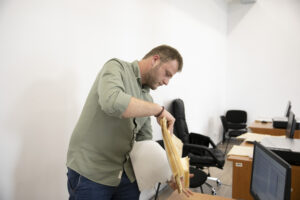
You have to dare: taking the first step from hopelessness to change
We met Giga Doghonadze in Kutaisi Central Archive. He has been working here since March, after successfully completing an on-site training. Today he is tasked with setting up an electronic database for the Land Registration Project. The work is rather laborious, but Giga does not look tired at all, telling us that he is fond of his job.
“During our three months of on-site training we had a wonderful leader who did their best to teach us everything,” says Giga, adding that all trainees had stayed on after they were offered a job.
He had no previous work experience, with a record of working on short-term summer positions only. Finding a job is not easy for young people in Georgia, and everything got more complicated for Giga with the pandemic. Giga’s hearing is impaired, and he lip-reads conversations. He was unable to do so when wearing face masks was mandatory.
“The pandemic started as soon as I had graduated from university, so I was unable to communicate with people. Then I developed inferiority complexes, and stayed at home all the time, I couldn’t go out.”
It was particularly difficult for Giga, and he began to feel there was no point in looking for a job. He stopped searching and even lost hope at some point. However, everything changed when he understood that he was exhausted by this type of existence and he had to change something in his life.
This is how Giga decided to approach the Employment Support Centre in Kutaisi. He was boosted by the consultation, where the interviewers focused on his good qualities.
“At the interview, I wasn’t treated in the usual way when people hear about my problem. Quite the opposite, they spoke about the good sides of my personality, thus improving my self-esteem,” says Giga.
After the consultation at the Employment Support Centre, Giga completed a career enhancement training course in digital competencies within the EU-funded ESCape project.
“I was bored with doing nothing, I was tired. The courses were online. I had problems with going out and communicating with people during the pandemic, and since the courses were online, I decided to enrol in the programme. I am self-taught in the digital field, so I wanted to gain additional knowledge.”
Only then he realised that he had been missing communication with people – he did not want to stop any more, and was inspired to start job-hunting.
“You know, at the outset, it is hard to make a step and acquaint yourself with people, but as soon as you dare, as soon as you learn something new, get acquainted with new people, you cannot stop wanting to do even more.”
Now he has emerged from his inferiority complexes, contacts lot of people and learns something new every day. He says that this is what he aims for today: to learn more and develop, and if he runs dry in this field, then he will decide what to do next:
“You are engaged, you are on the move all the time, and that is fine. After just a week of the on-site training, I knew I wouldn’t turn back, as I find it very enjoyable to work, to comprehend something new, to learn.”
However, the path to this point was not easy for Giga – he was scared, many times he thought to quit but nevertheless, he has succeeded and encourages others not to be afraid.
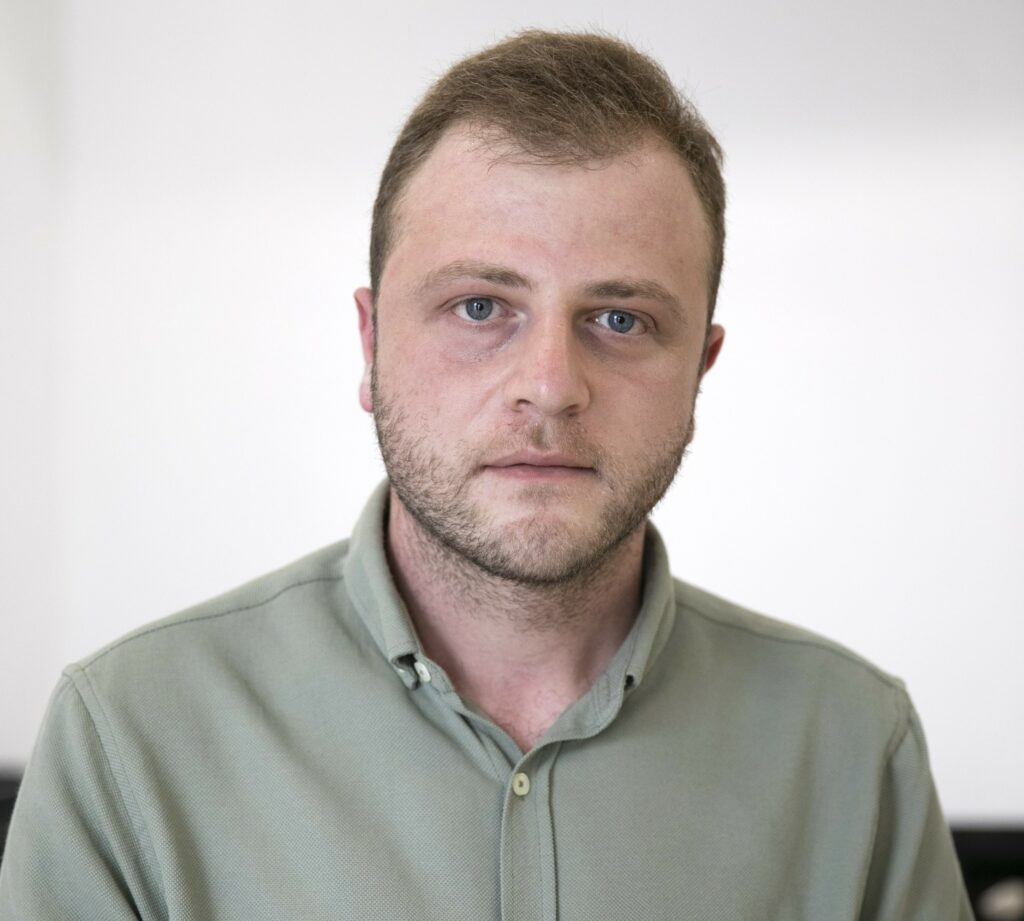
“Once you take the first step, then everything runs like clockwork, the main thing is to dare,” says Giga.
Now he enjoys the process of work so much that he has no time for negative thoughts. He likes helping people. For this reason, he wanted to become a medical doctor. He is a graduate of the public health and management department of Tbilisi State Medical University, though initially he studied at the department of general medicine.
“When my studies started and I had to take part in practice, in surgical operations, I assessed the situation and realised that the profession of an MD would be difficult to pursue. Wearing a face mask is obligatory – that’s the hospital rules. Then I changed the general medicine for the public health department, however, this did not matter much as I failed to reach my goal anyway in the end.
Do you know what I think now? If I were of that age now, and if I had to choose, I would never have quit. The situation is very different now, awareness is also higher,” says Giga.
“18 years is a very young age to understand what is the area of your interest, to make a decision and follow it.” In Giga’s opinion, people’s awareness-raising should start at an early age, from kindergarten and school. He says that people with disabilities should be integrated from the very beginning, as it is extremely difficult to change the way of thinking of an adult, grown-up person.
Giga was supported in managing these changes by the EU-funded project ESCape — Employment, Support, Counselling to meet Labour Market Needs. The project is jointly implemented by the Friedrich-Ebert-Stiftung in the South Caucasus (FES Georgia), State Employment Support Agency (SESA), Democracy Development Agency (DDA), and Education Development and Employment Centre (EDEC). The project covers Tbilisi and six regions of Georgia (Adjara, Imereti, Kakheti, Kvemo Kartli, Samegrelo and Shida Kartli), and ensures the employment and employability of the beneficiaries.
“The labour market is not inclusive; it is not tailored to people’s individual needs. People come across stigma and stereotypes, especially people with disabilities. They encounter problems at all stages of education and on the labour market,” says Diana Chomakhashvili, communications officer of the project.
ESCape supports the activation of employable human resources and their inclusion on the labour market, it helps the groups that face difficulties in dealing with employment problems individually.
“Our target groups include victims of violence, single parents, people with disabilities, people with a prolonged employment gap, people with no previous work experience or never involved in the educational process. They come across many obstacles on the labour market, and their path to employment is too hard,” Diana says.
She points out that specially retrained employment consultants offer beneficiaries individual career advice, professional retraining, and on-site training, supporting their employment in this way.
“At the same time as working with the jobseekers, we cooperate with employers, analyse the labour market, study vacancies and conditions offered by companies, study vacancy requirements. Therefore, we know the exact places to refer beneficiaries, we connect them with the employers, and work with them to tailor their environment and conditions to jobseekers. Our aim is to get both parties informed about conditions, and consequently, we work hard to correctly evaluate the expectations of both parties,” Diana says.
Nana Tsotsonava, the project manager in Kutaisi, tells us that they often have beneficiaries with no previous work experience, or with a lengthy career gap.
“They are met by totally different requirements on the labour market. We help them to get retrained and comply with the requirements of today’s labour market, e.g., get retrained at the professional college and acquire a new profession to find a job in the future,” says Nana.
“Giga Doghonadze is a wonderful example of how to reach a desired goal. He did not have any type of work experience and had no hopes but had an intense desire and motivation,” says Nana.
Nana Tsotsonava says the project will train organisations interested in the job model replication in their regions. The training will be held in five regions of Georgia, namely in Adjara, Kakheti, Kvemo Kartli, Shida Kartli and Samegrelo.
Three Employment Support Centres operate currently in Georgia under this project: two in Tbilisi, and one in Kutaisi. Those willing to have a consultation, participate in the re-training programmes and plan their careers can visit the centres at following addresses: 66a David Guramishvili Ave. and 33 Navtlughi Str. in Tbilisi, and 19 Newport Str. in Kutaisi.
Author: Ana Mskhaladze
Article published in Georgian by On.ge
MOST READ
SEE ALSO

No, time is not on Russia‘s side
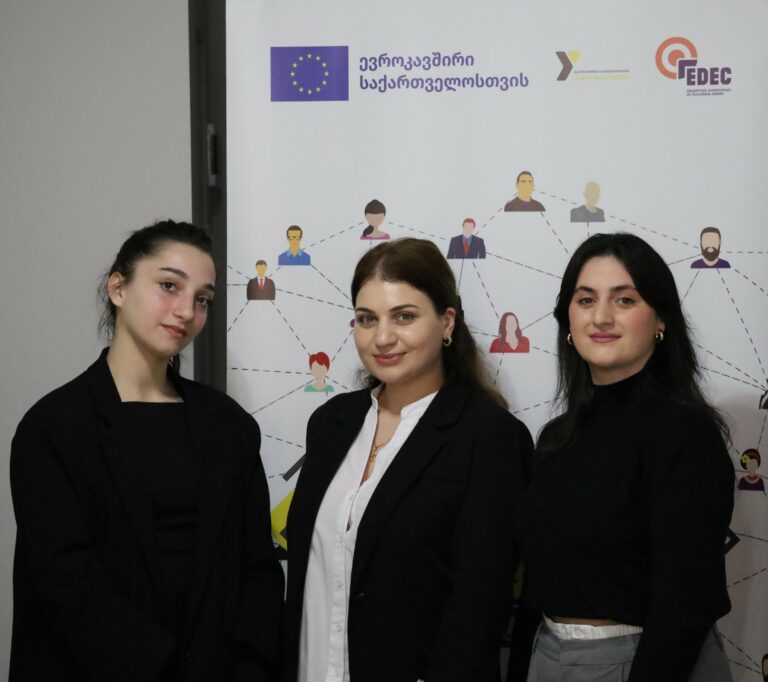
A hands-on approach to boost youth employment in Georgia
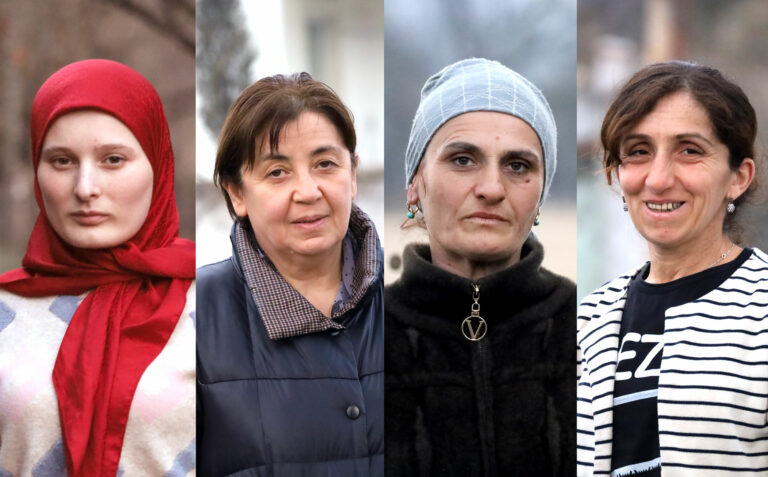
Taking health into their own hands: women’s empowerment in the remote villages of Georgia
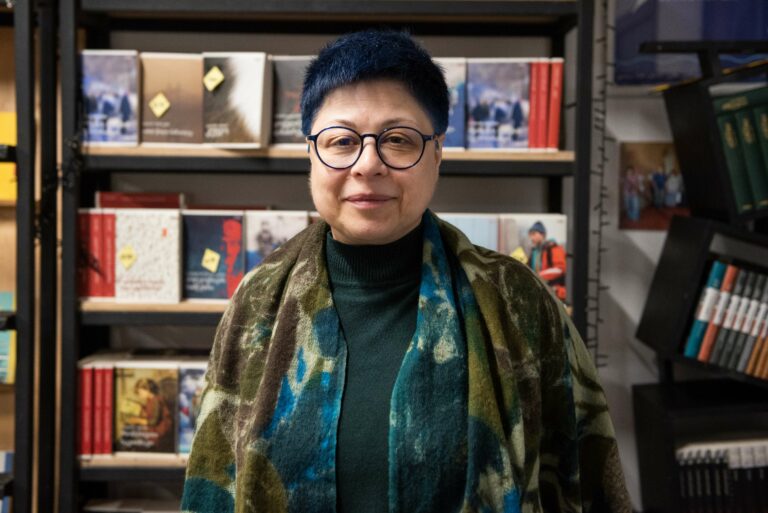
A woman publisher in a male-dominated industry – the path to a big dream

Be one step ahead of a hacker: check simple cybersecurity tips!
More campaign pages:
Interested in the latest news and opportunities?
This website is managed by the EU-funded Regional Communication Programme for the Eastern Neighbourhood ('EU NEIGHBOURS east’), which complements and supports the communication of the Delegations of the European Union in the Eastern partner countries, and works under the guidance of the European Commission’s Directorate-General for Neighbourhood Policy and Enlargement Negotiations, and the European External Action Service. EU NEIGHBOURS east is implemented by a GOPA PACE-led consortium. It is part of the larger Neighbourhood Communication Programme (2020-2024) for the EU's Eastern and Southern Neighbourhood, which also includes 'EU NEIGHBOURS south’ project that runs the EU Neighbours portal.

The information on this site is subject to a Disclaimer and Protection of personal data. © European Union,
